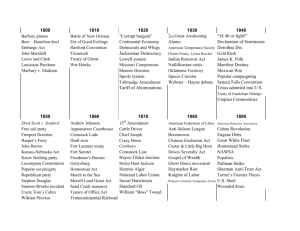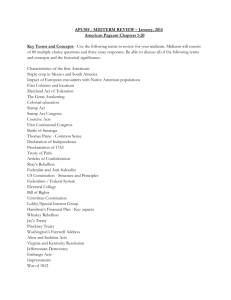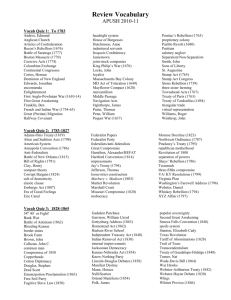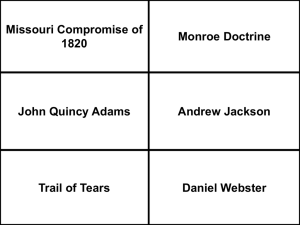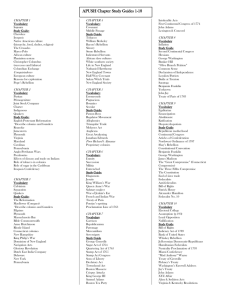AP US History Vocabulary List: Chapters 1-31
advertisement
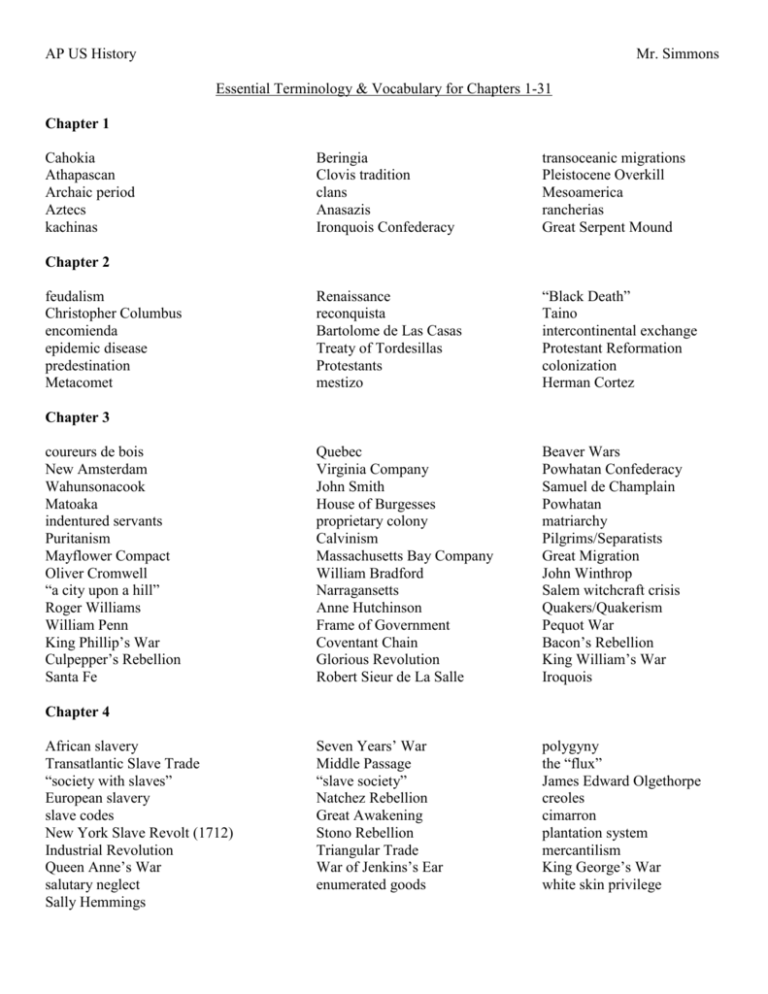
AP US History Mr. Simmons Essential Terminology & Vocabulary for Chapters 1-31 Chapter 1 Cahokia Athapascan Archaic period Aztecs kachinas Beringia Clovis tradition clans Anasazis Ironquois Confederacy transoceanic migrations Pleistocene Overkill Mesoamerica rancherias Great Serpent Mound Renaissance reconquista Bartolome de Las Casas Treaty of Tordesillas Protestants mestizo “Black Death” Taino intercontinental exchange Protestant Reformation colonization Herman Cortez Quebec Virginia Company John Smith House of Burgesses proprietary colony Calvinism Massachusetts Bay Company William Bradford Narragansetts Anne Hutchinson Frame of Government Coventant Chain Glorious Revolution Robert Sieur de La Salle Beaver Wars Powhatan Confederacy Samuel de Champlain Powhatan matriarchy Pilgrims/Separatists Great Migration John Winthrop Salem witchcraft crisis Quakers/Quakerism Pequot War Bacon’s Rebellion King William’s War Iroquois Seven Years’ War Middle Passage “slave society” Natchez Rebellion Great Awakening Stono Rebellion Triangular Trade War of Jenkins’s Ear enumerated goods polygyny the “flux” James Edward Olgethorpe creoles cimarron plantation system mercantilism King George’s War white skin privilege Chapter 2 feudalism Christopher Columbus encomienda epidemic disease predestination Metacomet Chapter 3 coureurs de bois New Amsterdam Wahunsonacook Matoaka indentured servants Puritanism Mayflower Compact Oliver Cromwell “a city upon a hill” Roger Williams William Penn King Phillip’s War Culpepper’s Rebellion Santa Fe Chapter 4 African slavery Transatlantic Slave Trade “society with slaves” European slavery slave codes New York Slave Revolt (1712) Industrial Revolution Queen Anne’s War salutary neglect Sally Hemmings Chapter 5 the French cresent middle colonies Cotton Mather Congregationalists Old Lights William Tennent the Spanish borderlands engages almanac Calvinist theology Great Awakening revivalism Toleration Act Enlightenment Half-Way Covenant New Lights George Whitefield Albany Plan of Union French & Indian War Royal Proclamation of 1763 Whigs John Locke actual representation Thomas Jefferson Declaratory Act John Hancock Crispus Attucks Intolerable Acts Committees of Correspondence Committee of Safety Paul Revere Battle of Lexington Thomas Paine George Washington Treaty of Paris Lord Dunmore’s War republicanism Stamp Act Samuel Adams Sons of Liberty Townshend Revenue Acts Boston Massacre John Adams Quartering Act Administration of Justice Act minutemen Battle of Bunker Hill Olive Branch Petition Common Sense Continental Army Abigail Adams “Molly Pitcher” Nathaniel Greene Battle of Yorktown Continental Congress Land Ordinance of 1785 Thomas Jefferson Constitutional Convention Phyllis Wheatley Valley Forge Loyalists United States Constitution Treaty of Alliance Charles Cornwallis Treaty of Paris (1783) John Jay Bill of Rights Absalom Jones nationalists Virginia Plan Federalists Mercy Otis Warren Tariff of 1789 Whiskey Rebellion Pinckney’s Treaty Thomas Jefferson Annapolis Convention New Jersey Plan Anti-Federalists Judiciary Act of 1789 speculation Treaty of Greenville Federalism XYZ Affair Chapter 6 Benjamin Franklin Edward Braddock Neolin John Peter Zenger Sugar Act virtual representation Patrick Henry nonimportation movement John Dickinson Tea Act of 1773 Boston Tea Party Quebec Act 1st Continental Congress 2nd Continental Congress Battle of Concord Benedict Arnold Declaration of Independence Chapter 7 patriots militia Tories Benedict Arnold Joseph Brant Articles of Confederation demobilization Northwest Ordinance of 1787 Bill for Establishing Religious Freedom Benjamin Banneker Chapter 8 Shays’ Rebellion James Madison Great Compromise Alexander Hamilton judicial review Intercourse Act Jay’s Treaty Republicans “Quasi-War” Federalist Party suffrage Alien & Sedition Acts Democratic Republican Party Judith Sargent Murray Jeffersonian Republicans states’ rights Thomas Jefferson Thomas Malthus “republic of virtue” Louisiana Purchase Toussaint L’Ouverture “peaceable coercion” Black Hawk War of 1812 Fort Dearborn nullification Era of Good Feelings Henry Clay Transcontinental Treaty of 1819 James Monroe Missouri Compromise republican agrarianism expansionism Monticello Napoleon Bonaparte Embargo Act Lewis & Clark Tecumseh War Hawks Battle of New Orleans Treaty of Ghent American System Rush-Bagot Treaty of 1817 Tariff of 1816 Panic of 1819 Battle of Tippecanoe Industrial Revolution internal slave trade Second Great Awakening black codes William Lloyd Garrison Nat Turner’s Revolt gang system Richard Allen yeoman gag rule Albany Regency abolitionism Nullification Crisis Trail of Tears Whigs “Tippecanoe and Tyler Too” Samuel B. Morse Democrats Old Hickory Tariff of 1832 Black Hawk Specie Circular William Henry Harrison Print Revolution Transportation Revolution commercialization interchangable parts “free labor” sentimentalism Ralph Waldo Emerson John Deere market revolution the Lowell mills mechanization class consciousness transcendentalism Henry David Thoreau Chapter 9 clipper ship Virginia Dynasty yeoman farmers Marbury v. Madison “venerate the plough” James Madison pan-Indian military resistance movement The Prophet Dolly Madison Andrew Jackson Land Act of 1820 John Calhoun 2nd Bank of the United States Monroe Doctrine John Quincy Adams Chapter 10 Eli Whitney King Cotton field vs. house slaves Gabriel’s Rebellion Denmark Vesey’s conspiracy proslavery argument Chapter 11 Martin Van Buren universal white manhood suffrage “Kitchen Cabinet” Indian Removal Act Bank War Second American Party System Davy Crockett Gibbons v. Ogden Chapter 12 apprenticeship putting-out system American System “wage slave” Catherine Beecher self-reliance Cyrus McCormick Chapter 13 Declaration of Sentiments Lucretia Mott Elizabeth Cady Stanton “Famine Irish” Astor Place Riot minstrel show urbanization Five Points Walt Whitman Edgar Allen Poe General Trades Union machine politics Tammany society sabbatarianism temperance American Society for the Promotion of Temperance Panic of 1837 Female Moral Reform Society Seneca Falls Convention Shakers Dorothea Dix Louisa May Alcott Oneida Community Joseph Smith Mormonism antislavery movement American Colonization Society Appeal to the Colored Citzens of the World William Lloyd Garrison Frederick Douglass Elijah Lovejoy the Amistad case American Anti-Slavery Society Liberty Party Sarah & Angelina Grimke Theodore Weld Chapter 14 Santa Fe Trail Overland Trails Empresarios Mexican-American War Gold Rush Liberty Party Treaty of Guadalupe Hidalgo “the indian problem” Oregon Trail Stephen F. Austin “Civil Disobedience” Wilmot’s Proviso popular soverignity Manifest Destiny Tejanos “remember the Alamo” Santa Anna free soil movement “Mr. Polk’s War” Abraham Lincoln Uncle Tom’s Cabin “the slave power” “Young America” movement John Brown Republican Party Lecompton constitution “Secret Six” Ostend Manifesto Stephen Douglas Compromise of 1850 popular sovereignity Kansas-Nebraska Act nativism Charles Sumner Panic of 1857 Constitutional Union Party Jefferson Davis Attack on Fort Sumter Legal Tender Act Morrill Tariff Act “cotton diplomacy” “contrabands” Ulysses S. Grant William Tecumseh Sherman Fort Pillow massacre John Wilkes Booth Battle of Shiloh Battle of Bull Run National Bank Act Homestead Act Anaconda Plan 13th Amendment copperheads Special Field Order #15 Battle of Gettysburg Pacific Railway Act Chapter 15 Lincoln-Douglas debates “American Renaissance” secession Fugitive Slave Act “Bleeding Kansas” Know-Nothing Party Scott v. Sandford John Brown’s Raid on Harper’s Ferry Confederate States of America Chapter 16 Mary Ann Bickerdyke Robert E. Lee “greenbacks” Morrill Land Grant Act Peninsular campaign Emancipation Proclamation New York Draft Riots Appomattox Battle of Antietam suspension of habeus corpus Chapter 17 Reconstruction Special Field Order #15 Congressional Reconstruction Tenure of Office Act Fourteenth Amendment Union League Scalawags Slaughterhouse cases Chinese Exclusion Act (1882) Compromise of 1877 Radical Republicans Freedman’s Bureau Civil Rights Act (1866) black codes Fifteenth Amendment sharecropping “redemption” “crop lien” system Liberal Republicans Rutherford B. Hayes Wade Davis Bill Andrew Johnson Reconstruction Act (1867) Ku Klux Klan Ulysses S. Grant carpetbaggers Ku Klux Klan Act (1871) Burlingame Treaty “waving the bloody shirt” Sand Creek Massacre Sitting Bull Caminetti Act Hispanic-American Alliance Timber Culture Act (1873) General Land Revision Dawes Severalty Act polygamy George A. Custer Nez Perce Edmunds Act lynching Morrill Act of 1862 “Buffalo Bill” Cody Omaha Act of 1882 horizontal combination “gospel of wealth” “gospel of work” Haymarket Square riot Booker T. Washington tenements the New Middle Class vaudeville interchangeable parts vertical integration Andrew Carnegie Knights of Labor Samuel Gompers W.E.B. DuBois Gilded Age Albert Spaulding Coney Island Chapter 18 Treaty of Fort Laramie Red Cloud “Helldorados” Edmunds-Tucker Act Homestead Act of 1862 National Reclamation Act Forest Management Act Sioux Ghost Dancers Chapter 19 Thomas Edison John D. Rockefeller Social Darwinism American Federation of Labor Eight Hour League Conspicuous consumption John Roebling Women’s Educational & Industrial Union Sherman Antitrust Act Chapter 20 Looking Backward (1888) Pendleton Civil Service Reform Act Southern Farmers’ Alliance Progress and Poverty (1879) Women’s Christian Temperance Union “protective association” Sherman Silver Purchase Act Dingley Tariff of 1897 Jim Crow laws John Marshall Harlan Ida B. Wells “the White Man’s Burden” Alfred Thayer Mahan “Remember the Maine” Interstate Commerce Commission populist movement grange Granger Laws Great Uprising of 1877 Munn v. Illinois (1877) People’s Party Coxey’s Army National American Woman Suffrage Association Pullman Strike (1894) Eugene V. Debs “free silver” “the social gospel” grandfather clauses nativism Plessy v. Ferguson (1896) segregation William Jennings Bryan Tom Watson Wilmington Riot (1898) Chicago World’s Fair “imperialism of righteousness” imperialism annexation of Hawai’i Spanish American War Theodore Roosevelt Rough Riders Anti-Imperialist League Chapter 21 Social Darwinism Progressive Era Jane Addams prohibition referendum recall muckraking The Shame of the Cities (1902) John Dewey Muller v. Oregon (1908) Women’s Temperance Christian Union Triangle Shirtwaist Fire Industrial Workers of the World “bohemian” National Association for the Advancement of Colored People “double consciousness” “the strenuous life” Food and Drug Act Hepburn Act Underwood-Simmons Act New Freedom Sixteenth Amendment Clayton Antitrust Act Federal Trade Commission Bread and Roses strike Jacob Riis initiative Robert M. LaFollette The Jungle (1906) “the social evil” Ludlow Massacre The Clansman (1905) Niagara Movement Sherman Antitrust Act John Muir Federal Reserve Act Woodrow Wilson Margaret Sanger Chapter 23 Second Industrial Revolution Middleton (1929) “roaring twenties” tabloid Volstead Act (1919) “new immigrants” “100% American” The Birth of a Nation (1915) The Scopes “monkey” Trial Herbert Hoover Dawes Plan Equal Rights Amendment Marcus Garvey F. Scott Fitzgerald welfare capitalism Henry Ford The Jazz Singer (1927) “black sox” scandal Al Capone “old immigrants” Immigration Act (1921) darwinism William Jennings Bryan “associative state” league of women voters “New Negro” “a lost generation” Sacco & Vanzetti open shop Model T The Amos ‘n’ Andy Show flapper bootlegging eugenics Ku Klux Klan Clarance Darrow fundamentalism Teapot Dome Scandal Sheppard-Towner Act Harlem Renaissance Earnest Hemingway crash of 1929 Bonus Army Franklin Delano Roosevelt “ first the hundred days” Public Works Administration Agricultural Adjustment Admin. “second hundred days” Social Security Act (1935) Resettlement Administration “New Deal coalition” Southern Tenant Farmers Union “okies” Federal Writers Project Walt Disney “the Black Cabinet” Black Tuesday New Deal “fireside chat” Eleanor Roosevelt Tennessee Valley Authority American Liberty League Father Charles Coughlin National Labor Relations Act John L. Lewis sunbelt The Dust Bowl Boulder Dam Communist Party, USA “swing era” Fair Labor Standards Act Chapter 24 Sit-down Great Depression Reconstruction Finance Corporation Emergency Banking Act Civilian Conversation Corps Federal Emergency Relief Administration National Industrial Recovery Act Huey Long Congress of Industrial Organizations Frances Perkins Agricultural Adjustment Administration Soil Conservation Service Indian Reorganization Act (1934) “Popular Front” Schecter v. United States (1935) “Roosevelt recession” court-packing Chapter 25 Manhattan Project Nazis Party Blitzkreig Allied powers “a date that will live in infamy” Office of War Information Rationing Korematsu v. United States (1944) Internment Zoot-suit riots (1943) Dwight D. Eisenhower Women’s Army Corps “battle fatigue” Joseph Stalin Battle of the Bulge Kamikaze Yalta Conference Enola Gay Executive Order #9981 Benito Mussolini Nuremberg Laws Neutrality Act of 1939 Lend-Lease Act (1941) War Powers Act bracero issei “Double V” campaign Congress of Racial Equality “the good war” GI Nisei conscientious objectors Operation Overlord Eastern Front Holocaust Winston Churchill Harry S. Truman Adolf Hitler Kristallnacht Axis powers Atlantic Charter Office of Strategic Services “Rosie the Riveter” Executive Order #9066 A. Philip Randolph Detroit riot (1942) Douglas MacArthur Executive Order #8802 “code talkers” Operation Torch D-Day “island hopping” genocide Potsdam Conference Nagasaki & Hiroshima J. Edgar Hoover International Monetary Fund the policy of containment North Atlantic Treaty Organization Berlin blockade Immigration & Nationality Act cold war liberalism “Give ‘em hell Harry” Central Intelligence Agency Whittaker Chambers Red Scare “baby boom” Chiang Kai-shek Truman’s Fair Deal Dwight D. Eisenhower V-J Day The Cold War Truman Doctrine Marshall Plan Smith-Mundt Act NSC 68 Taft-Hartley Act dixiecrat National Security Act (1947) Joseph McCarthy McCarthyism consumerism Mao Zedong United Nations rock-n-roll Levittown The Feminine Mystique (1963) C. Wright Mills teen delinquency Sputnik covert action Ho Chi Minh The Affluent Society (1958) Federal Highway Act (1956) Landrum-Griffin Act George Meany Rebel Without a Cause “antiimperialism” American intervention abroad “military industrial complex” Chapter 26 Servicemen’s Readjustment Act “the American century” World Bank The “iron curtain” speech Executive Order #9835 Internal Security Act Atomic diplomacy Council of Economic Advisers National Security Council House Un-American Activities Committee Julius & Ethel Rosenberg film noir “zeal for democracy” Korean War Atomic Energy Act Chapter 27 Elvis Presley Federal Housing Administration National Defense Education Act (1958) The Organization Man (1956) Jonas Salk The Beats Nikita Khrushchev Geneva accord Committee for a Sane Nuclear Policy John F. Kennedy Southeast Asia Treaty Organization Kennnedy’s inaugural address National Aeronautics & Space Administration Bay of Pigs Fidel Castro Limited Nuclear Test-Ban Treaty Lee Harvey Oswald assassination of Pres. Kennedy New Frontier Alliance for Progress Cuban Missle Crisis Great Society Lyndon B. Johnson Chapter 28 Montgomery Bus Boycott Martin Luther King, Jr. E. D. Nixon To Secure These Rights (1947) Jackie Robinson Congress of Racial Equality Missouri vs. ex.rel. Gaines (1939) McLaurin vs. OK State Regents Brown vs. Board of Education (1952) Kenneth B. Clark Southern Christian Leadership Conference Little Rock 9 Student Non-Violent Coordinating Committee John Lewis Ella Baker nonviolent civil disobedience Albany Movement James Merideth Eugene “Bull” Conner Letter From Birmingham Jail March on Washington “I have a dream” speech Civil Rights Act of 1964 Mississippi Freedom Democratic Party Voting Rights Act of 1965 Malcolm X Nation of Islam League of United Latin American Citizens “Bloody Sunday” National Congress of American Indians Immigration & Nationality Act Rosa Parks “freedom ride” Ralph Bunche Southern Manifesto Thurgood Marshall sit-in “beloved community” James Farmer “jail, not bail” George Wallace Bayard Rustin Freedom Summer Bob Moses Elijah Muhammad “Operation Wetback” Greensboro sit-in Chapter 29 Students for a Democratic Society Tonkin Gulf Resolution Operation Rolling Thunder Free Speech Movement counterculture Black Power Movement Office of Economic Opportunity Community Action Program Watts Uprising (1965) Tet Offensive Robert F. Kennedy 1968 Democratic National Convention Black Panther Party for Self-Defense Women’s Liberation Movement Gay Liberation Movement United Farm Workers “Trail of Broken Treaties” “vietnamization” My Lai Massacre Strategic Arms Limitation Treaty Pentagon Papers War Powers Act of 1973 The Port Huron Statement (1962) Barry Goldwater William Westmoreland J. William Fulbright “summer of love” “turn on, tune in, drop out” War on Poverty The Great Society Detroit’s “Great Rebellion” Stokely Carmichael “the whole world is watching” “yippies” Black Power (1967) American Indian Movement Sexual Politics (1970) Chicano Asian American Political Alliance George C. Wallace “peace with honor” Environmental Protection Agency “dirty tricks” Ho Chi Minh Lyndon B. Johnson Vietcong Vietnam War Mario Savio napalm The Other America (1962) Medicare Kerner Commission James Earl Ray Hubert H. Humphrey Huey P. Newton “sisterhood is powerful” La Raza Stonewall Riot Cesar Chavez Richard M. Nixon Henry Kissinger Kent State Shooting Watergate Spiro T. Agnew Chapter 30 “born again” Christians Jimmy Carter Gerald Ford Ronald Reagan “Reaganomics” sunbelt Organization of Petroleum Exporting Countries Title VII of Civil Rights Act deregulation Affirmative Action Three Mile Island Incident Silent Spring (1962) The Moral Majority Roe vs. Wade (1973) The New Right “the ME decade” “moonies” “No More Vietnams” Camp David Accords Carter Doctrine detante Iran Hostage Crisis Wealth and Poverty (1981) Economic Recovery Tax Act (1981) Bakke vs. University of Califonia (1978) “celebration of wealth” “feminization of poverty” “the evil empire” Acquired Immune Deficiency Syndrome Strategic Defense Initiative Contras Iran-Contra Scandal George H. W. Bush glasnost perestrokia Fall of the Berlin Wall Chapter 31 9/11 Saddam Hussein North American Free Trade Agreement Welfare Reform Act (1996) “ethnic cleansing” “electronic culture” Immigration Reform & Control Act (1986) Timothy McVeigh Defense of Marriage Act “The New Economy” Global Warming “war on terror” weapons of mass destruction UN Resolution 1441 Persian Gulf War Gramm-Rudman World Trade Organization Bosnia Silicon Valley World Wide Web Osama Bin Laden multiculturalism antiabortion movement bilateralism Kyoto Protocol Operation Enduring Freedom USA Patriot Act (2001) Abu Ghraib prison Operation Desert Storm William J. Clinton “Contract with America” Kosovo Internet Los Angeles Riots Branch Davidians Proposition 187 Whitewater 2000 Election Controversy globalization jihad Al Qaeda “regime change”



